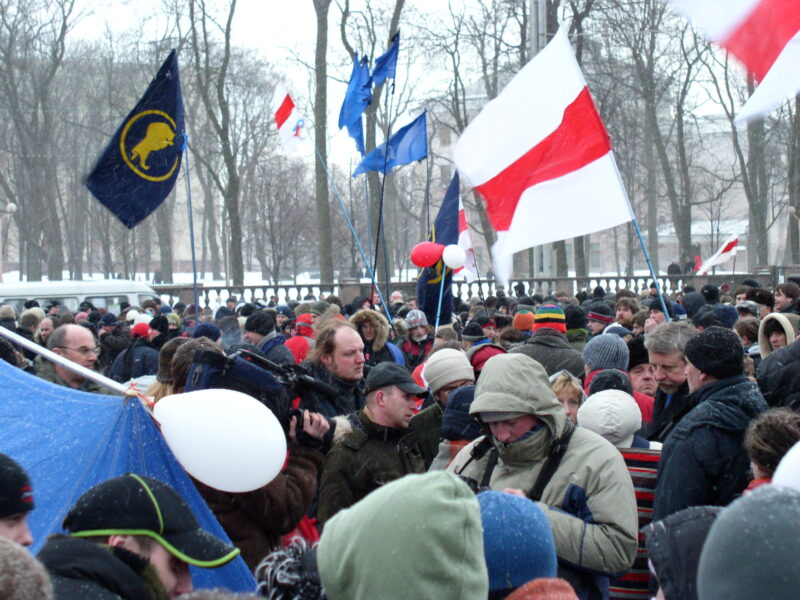Mass protests in Belarus against President Alexander Lukashenko have left the international community wondering about the direction they may take. Protesters have been active since the August 9th election, when Lukashenko had a landslide victory against opposition leader Sviatlana Tsikhanouskaya. The protesters claim the election was rigged, shooing-in Lukashenko for a sixth term as president in his 26th year in power as an autocrat. This past spring, Lukashenka imprisoned political rivals, including video blogger Sergei Tikhanovsky, Tsikhanouskaya’s husband, who was campaigning for president. Tsikhanouskaya took over his campaign. Opponents believed that as a woman, she would not be able to counter Lukashenko, but her campaign rallies drew huge crowds. She proposed a “people’s ultimatum” on October 13th that the president resign or strikes would ensue, to which Lukashenko responded “in your dreams.” One of the largest rallies in the protests so far followed in the capital of Minsk on October 25, consisting of around 200,000 people.
According to Reuters, more than 15,000 demonstrators have been arrested in the span of protests, and almost all opposition leaders fled or were imprisoned. Tsikhanouskaya fled to Lithuania herself, while still encouraging the strike. The Associated Press quoted her as saying, “a strike is the next step towards freedom for Belarusians, towards the end of violence and new elections. The main goal is to show that no one will work for the regime.” Although many state-run factories did not shut down, private businesses such as shops and restaurants were closed. Lukashenko has gone to work as normal during the protests, but is clearly apprehensive of what may come from them. Political analyst Valery Karbalevich told the Associated Press, “even the threat of a strike makes Lukashenko nervous, and growing mass rallies show that the protest is not dying down, and the pressure on the authorities and officials within the country will continue to mount.” Lukashenko appointed a new interior minister and police chief for Minsk, and also closed Belarus’s borders to Poland, Lithuania, Latvia, and Ukraine. He responded to the protests, “that’s it. We have nowhere to retreat, and we are not going to retreat,” said the Moscow Times.
According to the Atlantic Council, the protestors have demanded an end to state violence, release of political prisoners, free elections, and democracy. The tension in Belarus has inevitably invoked the attention of the international community. Russia has expressed support for Lukashenko and given a $1.5 billion loan to cover the debt that Belarus owes it. The EU has shown support for the protestors and for Tsikhanouskaya, even giving her a human rights prize. Russia may see the protestors’ call for the end of Lukashenko’s autocracy and push for democracy as a threat to Russian interests in the region. However, Tsikhanouskaya has urged that Belarus is not the grounds for a standoff between Russia and the West. The Atlantic Council quoted her saying, “the revolution in Belarus is not a geopolitical revolution. It is neither an anti-Russian nor a pro-Russian revolution. It is neither anti-EU nor pro-EU. It is a democratic revolution.” This leaves a tricky situation where Russia and the West could influence the outcome of the conflict, but are hesitant to provide aid and formal backing. The fear is that as protests continue, they could become violent. As of now, police have threatened protestors by shooting warning shots in the air or rubber bullets and detaining them, but there has not been a deadly standoff. The West can view the conflict at arm’s length, but if there are signs that the protests will escalate to violence, they will need to take a more active response through sanctions or even intervention.
Lukashenko has been in office since 1994 and has been known to be intolerant to any opposition. Those who are vocal against his regime have been suppressed through violence and arrests. Human rights violations such as the prevention of freedom of expression, arbitrary detention, property confiscation, police brutality, and poor treatment of prisoners have been prevalent, according to Amnesty International. The EU and US have imposed sanctions in the past for human rights purposes. Lukashenko recently did visit a prison and met with opposition activists, but commentators have said that this was a strategic move to “imitate” dialogue, according to ABC News. At this point, it is key for the protestors to remain non-violent, which could avoid a calamitous conflict and put Lukashenko in an ideal position to allow for more dialogue.
As tension escalates in Belarus, protestors should maintain their efforts but keep their demonstrations non-violent. The West should be prepared for signs of violence, and equipped to respond if violence ensues. Whatever happens in the upcoming months, the Belarusian people have made clear that they want change, and it is unlikely that the country will remain the way it has been during the decades under Lukashenko’s rule.


